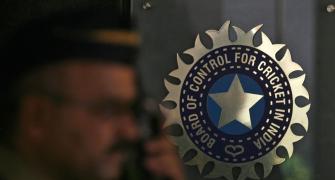After hikes of 20-25 per cent in salary last year, aviation industry executives say increments, including those of pilots and executives, are not expected to be more than 3-6 per cent this year.
Most major carriers -- barring Deccan (which has a August-September financial year) and Kingfisher airlines -- do not agree on the figure.
Hitesh Patel, executive vice-president, Kingfisher, said, "We have not yet decided on our increments but will follow the industry benchmarks."
Manpower costs add up to 14 per cent of the total cost for airlines as compared with six to eight per cent for other sectors. Manpower costs have risen in excess of 100 per cent over the past four years, according to HR executives in airlines.
"We might be looking at a figure of six per cent as an annual raise this year," said an executive at one of the private carriers not wanting to be named. Insiders at low-cost carriers peg the rise at three per cent.
"Post 9/11, airlines handed a token sum of Rs 500 as raise. In the present scenario, the airlines are bleeding and there is little difference between a raise of zero or three per cent. So, some of the carriers might decide against a raise this year," said an HR executive.
Analysts say that companies are looking at reducing their manpower costs in order to tide over losses of $1 billion expected by the financial year-end.
And while they have no control over fuel costs, which have hit new highs (they constitute for 45% of the total operational cost), they have no choice but to trim other costs where there is some leeway still.
"Due to cost pressures, airlines would be looking at cutting manpower costs as there is little likelihood of a rationalisation in the cost of aviation turbine fuel. So, reducing staff costs is an option airlines will consider," said Aniket Mhatre, aviation analyst at brokerage firm Prabhudas Liladhar.
"With foreign airlines entering Indian skies, wage demands have become internationally competitive. As a result, our manpower costs have gone up by 100 per cent over the past three-four years. Employee costs are a major concern with airlines today," said S Chalke, senior general manager (HR), Jet Airways.
The pressure on salaries is due to two reasons. First, the overall costs are going up even as carriers are unable raise revenues by hiking fares due to excess capacity. On the other hand, the shortage of co-pilots, cabin crew, engineers is now more or less over.
Commercial pilot licence holders are exceeding the required number. For an industry demand of 3,000, there are now 5,000 CPL holders waiting in the wings.
"Six months back, we received 600 applications for first officers against a small number of openings. Now, we have received 200 applications and we are not even looking out for first officers," said a senior executive with Jet Airways.
Similarly, cabin crew academies have created more trained people than were earlier available for hiring," said a Simplifly Deccan executive.
Many carriers are delaying the delivery of new aircraft and toning down their growth plans in order to reduce losses.
Hence, the pressure of hiring and the yawning gap between demand and supply is also easing out.
"Earlier, projected manpower scarcity was pushing wages up. Now, due to the surplus employee situation, airlines cannot afford to increase the employee costs too much," said Kuljit Singh, partner, Ernst & Young.








